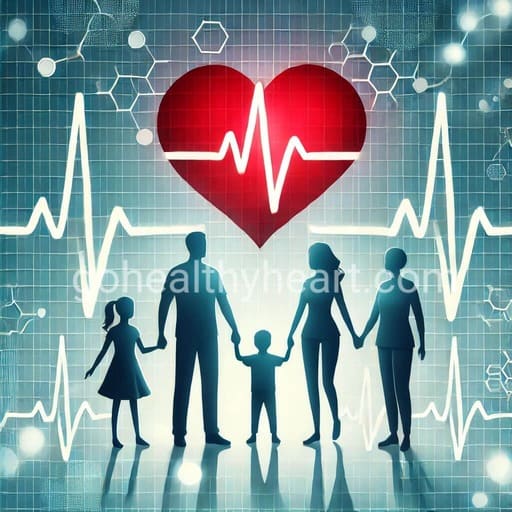Heart Defects and Siblings: The Guide Indian Parents Need Now

Table of Contents
- Introduction
- Understanding the Emotional Impact of Heart Defects and Siblings’ Relationships
- Effective Communication Strategies About Heart Defects and Siblings
- Practical Strategies for Supporting Heart Siblings
- Recognizing When Heart Defects and Siblings Need Additional Support
- Building Resilience in Heart Defects and Siblings’ Relationships
- Resources for Indian Families Navigating Heart Defects and Siblings’ Needs
- Conclusion: Heart Defects and Siblings’ Journey Together
- Frequently Asked Questions About Heart Defects and Siblings
Introduction
When a child is diagnosed with a congenital heart defect (CHD), the entire family embarks on an unexpected journey filled with medical appointments, hospital stays, and emotional challenges. While our medical attention naturally focuses on the child with heart defects and siblings often become the unintentional supporting characters in this story. These “heart siblings” navigate a complex landscape of emotions, changing family dynamics, and new responsibilities that can profoundly impact their development and well-being.
As a pediatric cardiologist working with families across India, I’ve witnessed firsthand how heart defects and siblings’ relationships influence each other. This comprehensive guide aims to help Indian parents effectively communicate about heart defects with siblings while providing practical strategies to support their emotional well-being throughout this journey.
Understanding the Emotional Impact of Heart Defects and Siblings’ Relationships
The diagnosis of a congenital heart defect affects every family member differently. Siblings of children with heart defects may experience a spectrum of emotions that evolve throughout their journey:
The Complex Emotional Landscape
Siblings often struggle with conflicting feelings that they may not have the vocabulary or emotional maturity to express. Research indicates that siblings of children with heart defects and other serious medical conditions report lower quality of life and increased behavioral issues compared to peers with healthy siblings.
Young siblings might experience:
- Confusion and fear: Unable to fully comprehend what’s happening, siblings may develop anxiety about their brother or sister’s health and future.
- Jealousy and resentment: The additional attention and care required by a child with heart defects can make siblings feel neglected or less important, particularly during hospitalizations or medical crises.
- Guilt: Some siblings develop irrational guilt, wondering if they somehow caused the heart defect or feeling guilty about being healthy themselves.
- Protectiveness: Many siblings develop a strong protective instinct, taking on emotional responsibilities beyond their years.
Within Indian family structures, where extended family relationships play significant roles, these dynamics can become even more complex. Grandparents, aunts, uncles, and cousins may all influence how siblings process and understand heart defects and siblings’ relationships.
Cultural Considerations for Indian Families
In many Indian families, discussing serious health conditions with children remains taboo, with adults attempting to “protect” children by withholding information. However, research consistently shows that age-appropriate honesty helps siblings develop healthy coping mechanisms. Understanding heart defects and siblings’ needs simultaneously is essential for family harmony.
The concept of “perfect health” holds particular cultural significance in some Indian communities, where disabilities or chronic conditions might carry stigma. Siblings may face questions or comments from extended family, neighbors, or classmates that reflect these attitudes, creating additional emotional burden.
Effective Communication Strategies About Heart Defects and Siblings
How and what you communicate about heart defects to siblings significantly impacts their ability to cope. The key is providing age-appropriate information that helps them understand without overwhelming them.
Age-Appropriate Communication About Heart Defects and Siblings
For Toddlers and Preschoolers (2-5 years)
Children at this age benefit from simple, concrete explanations:
- Use basic analogies: “Your sister’s heart has a small hole that makes it work harder, like a bicycle with a slightly flat tire.”
- Emphasize what remains normal: “Brother still loves to play and laugh, just like you. Sometimes he gets tired faster and needs extra rest.”
- Address fears directly: “The doctors are helping fix the heart. You cannot catch heart defects from your brother.”
- Use dolls or stuffed animals to explain: Demonstrate medical procedures on toys to help normalize the experience.
Maintaining regular routines is especially important for young siblings, as they derive security from predictability during otherwise turbulent times.
For School-Age Children (6-12 years)
At this age, siblings can understand more details about heart defects and siblings’ different needs:
- Provide anatomical context: “The heart has four chambers and valves that help blood flow properly. Your sister’s valve didn’t form correctly before birth.”
- Explain treatments honestly: “The surgery will help repair the heart defect. Your brother will have a scar and might need to take medicine, but he’ll feel much better afterward.”
- Address school and social concerns: Help them prepare responses for when classmates ask questions about their sibling’s condition.
- Involve them appropriately: “Would you like to make a card for your sister while she’s in the hospital? Or help organize her medicines when she comes home?”
Children in this age group may worry about their sibling’s mortality or develop somatic complaints (like stomachaches) to seek attention. Validating these feelings while maintaining appropriate boundaries is crucial.
For Adolescents (13-18 years)
Teenagers can understand complex medical information and often appreciate being treated as mature family members:
- Share detailed explanations about heart defects and siblings’ experiences: “Your brother has Tetralogy of Fallot, which involves four different structural problems with his heart.”
- Discuss long-term implications: Be honest about potential limitations while emphasizing capabilities.
- Acknowledge increased responsibilities: “We appreciate how you’ve helped care for your sister, but we also want you to maintain your own activities and friendships.”
- Discuss genetic considerations: If relevant, provide age-appropriate information about hereditary aspects of certain heart defects and siblings’ potential concerns.
Research shows that older siblings (12+ years) often demonstrate worse adjustment to having a sibling with CHD, possibly due to greater awareness of the implications and increased family responsibilities. Particularly in Indian households, elder sisters often bear a disproportionate caregiving burden that should be carefully monitored and balanced.
Practical Strategies for Supporting Heart Siblings
Supporting siblings requires intentional effort while balancing the needs of the child with heart defects and siblings who are healthy. Here are practical approaches that work well in Indian family contexts:
Creating Balance in Family Attention
The perception of unequal attention is a primary source of difficulty for siblings. Strategies to address this include:
- Scheduled one-on-one time: Even 15-20 minutes of undivided attention daily can reassure siblings of their importance. This practice of “special time” aligns well with Indian family values of meaningful connection.
- Extended family involvement: Engage grandparents, aunts, or uncles to spend quality time with siblings during hospital stays or when parents’ attention is divided.
- Celebrate all achievements: Make equal efforts to acknowledge academic, artistic, sports, or other accomplishments of all children in the family.
- Create family rituals: Establish regular activities that include everyone, such as weekly game nights or special meals where heart defects and siblings’ different needs can coexist harmoniously.
In many Indian households, academic achievement receives significant emphasis. Ensure that siblings’ educational needs remain prioritized even during medical crises, perhaps by arranging study support through family members or trusted tutors.
Involving Siblings in Care Appropriately
Finding the right balance of inclusion without overwhelming siblings is challenging but important:
- Age-appropriate tasks: Young children can select toys or books to bring to the hospital, while older siblings might help with medication organization or accompany their sibling to less-intensive appointments.
- Hospital visits: When appropriate, allow siblings to visit the hospital prepared with information about what they’ll see (monitors, tubes, etc.). Many Indian hospitals have become more accommodating of sibling visits, recognizing their importance for family cohesion.
- Symbolic participation: Programs like the Heart Beads initiative, where siblings can thread beads representing medical milestones, help them process and participate in their sibling’s journey.
- Decision inclusion: When appropriate, include siblings in family discussions about care decisions, letting them feel valued as family members.
Remember that involvement should never feel like a burden. Monitor siblings for signs of being overwhelmed and adjust expectations accordingly.
Normalizing the Medical Experience
For many siblings, hospitals and medical equipment can seem frightening and alien. Helping demystify these experiences is valuable:
- Medical play: Use toy medical kits to familiarize younger siblings with equipment they might see.
- Books and resources: Several Indian publishers now offer children’s books about hospital experiences and heart conditions. These culturally relevant materials help normalize the experience.
- Virtual tours: Many hospitals offer virtual or in-person orientation tours for siblings to become comfortable with the environment.
- Meeting the medical team: When possible, introduce siblings to key members of the medical team, helping them understand these are people helping their brother or sister.
In Indian healthcare settings, where medical hierarchies can be pronounced, helping siblings feel comfortable asking questions is especially important.
Recognizing When Heart Defects and Siblings Need Additional Support
Despite best efforts, some siblings may struggle to adjust to the challenges of having a brother or sister with a heart defect. Knowing when to seek additional help is crucial:
Warning Signs That Siblings Need Extra Support
Watch for these indicators that a sibling might be struggling:
- Behavioral regression: Return to earlier behaviors like bed-wetting, baby talk, or excessive dependency
- Academic changes: Declining grades, lack of concentration, or school avoidance
- Emotional withdrawal: Becoming unusually quiet, avoiding family interaction, or spending excessive time alone
- Acting out: Increased aggression, defiance, or attention-seeking behaviors
- Physical complaints: Frequent headaches, stomachaches, or other symptoms without medical cause, sometimes mimicking the affected sibling’s symptoms
- Sleep disturbances: Nightmares, insomnia, or excessive sleeping
- Risk-taking behaviors: Particularly in adolescents, engaging in dangerous activities
Research indicates that female siblings often internalize stress (becoming anxious or withdrawn), while male siblings may externalize through behavioral issues. Both patterns warrant attention.
Professional Support Options in India
When siblings show persistent signs of distress, professional support can be beneficial:
- Child psychologists and counselors: Many major Indian cities now have specialists in supporting siblings of children with chronic conditions.
- School counselors: Engage school resources to provide additional emotional support during school hours.
- Support groups: Organizations like HeartLine and Tiny Tickers have established Indian chapters offering sibling support programs.
- Family therapy: Sometimes addressing family dynamics as a whole provides the most effective intervention.
- Art or play therapy: Particularly effective for younger children who may struggle to verbalize complex emotions.
In India’s collective family culture, the concept of seeking mental health support is gradually becoming more accepted. Framing this support as strengthening the family unit can help overcome lingering stigma.
Building Resilience in Heart Defects and Siblings’ Relationships
While supporting siblings through challenges is essential, equally important is fostering the potential for positive growth and resilience that can emerge from this experience:
Potential Positive Outcomes
Research suggests that siblings of children with chronic health conditions often develop exceptional strengths:
- Enhanced empathy: Greater understanding of others’ struggles and needs
- Emotional intelligence: Advanced ability to recognize and manage complex emotions
- Responsibility and independence: Practical life skills developed through family participation
- Perspective: Appreciation for health and deeper understanding of what matters in life
- Family cohesion: Stronger family bonds forged through shared challenges
These positive outcomes are more likely when families provide appropriate support and balance throughout the journey.
Cultivating Sibling Bonds
Heart defects and siblings’ relationships don’t have to be defined by the medical condition:
- Emphasize common interests: Encourage activities both children can enjoy together, adapting as needed for physical limitations.
- Create shared memories: Plan special outings or experiences that build positive associations between siblings.
- Facilitate mutual support: Help siblings understand how they each contribute to the family in valuable ways.
- Normalize discussions: Create a home environment where questions about heart defects and siblings’ feelings are welcomed without judgment.
Many Indian families find strength in cultural and religious traditions that emphasize family unity and mutual care. Drawing on these values can help siblings understand their role in a supportive family system.
Resources for Indian Families Navigating Heart Defects and Siblings’ Needs
Several organizations and resources specifically cater to Indian families dealing with pediatric cardiac issues:
- Indian Association of Pediatric Cardiology: Offers resources and connects families with similar experiences
- Heart to Heart Foundation: Provides financial and emotional support for families of children with heart defects
- Children’s Heart Foundation (India chapter): Offers sibling support programs and educational resources
- Genesis Foundation: Works specifically with CHD families across India
Local pediatric cardiology centers often maintain resource libraries with age-appropriate books and materials for siblings.
Conclusion: Heart Defects and Siblings’ Journey Together
The journey of heart defects and siblings’ relationships is both challenging and potentially transformative. With thoughtful communication, deliberate balance, and appropriate support, siblings can not only cope but thrive alongside their brother or sister with CHD.
Remember that each child is unique, and strategies should be adapted to individual personalities, family circumstances, and cultural contexts. The goal is to create an environment where all children feel secure, valued, and equipped to handle the unique challenges and opportunities their family faces.
By addressing the needs of all family members, we create stronger support systems for the child with heart defects while nurturing the well-being and resilience of their siblings—allowing the entire family to move forward together with strength and hope.
Frequently Asked Questions About Heart Defects and Siblings
Use age-appropriate language and simple analogies based on their understanding level. For younger children, describe the heart as a special pump with rooms and doors that sometimes need fixing. Reassure them that heart defects are not contagious and that doctors are helping. For older children, you can gradually introduce more detailed explanations using drawings or models. Always invite questions and validate their concerns while maintaining a hopeful tone.
Behavioral changes are common responses to stress and shifting family dynamics. Your healthy child might feel confused, jealous of the extra attention their sibling receives, or anxious about the changes in family routines. Some children “act out” because they don’t know how to express complex emotions verbally. Establish regular one-on-one time with your healthy child, validate their feelings, and maintain consistent discipline with empathy. If concerning behaviors persist, consider consulting a child psychologist.
When appropriate and prepared properly, hospital visits can help siblings understand what’s happening and reduce frightening fantasies about the hospital experience. Before visits, explain what they might see (medical equipment, IVs) in age-appropriate language. Keep initial visits brief and positive, perhaps bringing a small activity to do together. However, respect if a sibling feels uncomfortable visiting—forced exposure can increase anxiety. Virtual connections through video calls can be a good alternative when in-person visits aren’t possible.
Creating intentional balance requires planning. Schedule dedicated one-on-one time with each child daily, even if just 15-20 minutes of undivided attention. Enlist extended family to help ensure siblings receive attention during intensive medical periods. Create a “special time” calendar that siblings can see, helping them predict when they’ll have your focus. Remember that quality matters more than quantity—being fully present during interactions has more impact than longer periods of distracted time.
Watch for persistent changes in behavior, sleep patterns, academic performance, or physical complaints without medical cause. Signs of distress vary by age—younger children might regress developmentally (bedwetting, baby talk), while older children might withdraw socially or show declining grades. Adolescents might engage in risk-taking behaviors or become excessively responsible. If these patterns continue for more than a few weeks or significantly impact daily functioning, consider professional support.
Some congenital heart defects have genetic components, while others occur sporadically. Siblings have a slightly higher risk compared to the general population—studies suggest approximately 3-5% recurrence risk in families with one affected child. Whether siblings should undergo cardiac screening depends on the specific heart defect and family history. Discuss this with your pediatric cardiologist, who can recommend appropriate evaluations based on your family’s situation and provide genetic counseling if needed.
Foster connection by creating opportunities for positive interactions unrelated to medical care. Encourage age-appropriate shared activities that accommodate physical limitations. Help siblings identify common interests and facilitate those connections. Teach the sibling with heart defects to acknowledge their brother or sister’s support, and help healthy siblings understand their important role in the family. Create family traditions and memories that celebrate your children’s relationship beyond the medical condition.
Resources are growing across India. The Indian Association of Pediatric Cardiology offers support programs, and major hospitals like AIIMS and Narayana Health have developed sibling support initiatives. Organizations like Genesis Foundation and Children’s Heart Foundation provide educational materials in multiple Indian languages. Some centers offer “Sibling Workshops” during treatment phases. Ask your pediatric cardiology team about local resources, as these vary significantly by region within India.
In Indian family structures, well-meaning relatives might unintentionally create imbalances by showing excessive concern for the child with heart defects while overlooking siblings’ needs. Address this proactively by educating family members about the importance of treating all children equitably. Provide specific suggestions for how relatives can support siblings. When necessary, establish respectful boundaries about gift-giving, attention, and discussions of the heart condition in front of siblings.
Consider professional support if you observe persistent emotional or behavioral changes that interfere with daily functioning, social relationships, or academic performance. Counseling may be particularly beneficial during major transitions (initial diagnosis, surgeries, school changes) or if siblings express feelings of severe anxiety, depression, or family disconnection. In India, pediatric counseling services are increasingly available through hospital systems and private practice, with some now offering telehealth options for families in areas with limited local resources.



